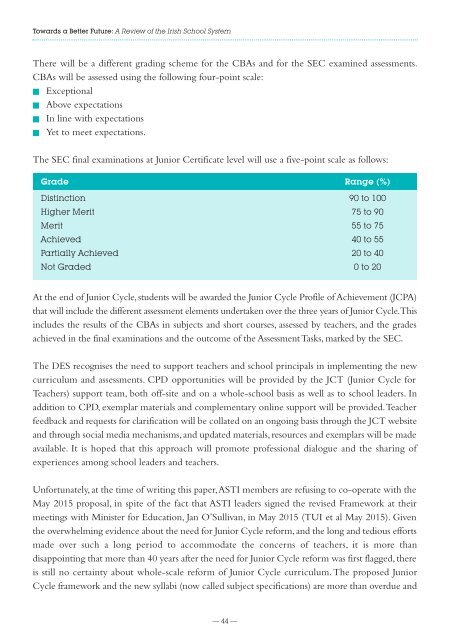Towards a Better Future
A Review of the Irish School System John Coolahan | Sheelagh Drudy Pádraig Hogan | Áine Hyland | Séamus McGuinness
A Review of the Irish School System
John Coolahan | Sheelagh Drudy Pádraig Hogan | Áine Hyland | Séamus McGuinness
You also want an ePaper? Increase the reach of your titles
YUMPU automatically turns print PDFs into web optimized ePapers that Google loves.
<strong>Towards</strong> a <strong>Better</strong> <strong>Future</strong>: A Review of the Irish School System<br />
There will be a different grading scheme for the CBAs and for the SEC examined assessments.<br />
CBAs will be assessed using the following four-point scale:<br />
■ Exceptional<br />
■ Above expectations<br />
■ In line with expectations<br />
■ Yet to meet expectations.<br />
The SEC final examinations at Junior Certificate level will use a five-point scale as follows:<br />
Grade Range (%)<br />
Distinction 90 to 100<br />
Higher Merit 75 to 90<br />
Merit 55 to 75<br />
Achieved 40 to 55<br />
Partially Achieved 20 to 40<br />
Not Graded 0 to 20<br />
At the end of Junior Cycle, students will be awarded the Junior Cycle Profile of Achievement (JCPA)<br />
that will include the different assessment elements undertaken over the three years of Junior Cycle. This<br />
includes the results of the CBAs in subjects and short courses, assessed by teachers, and the grades<br />
achieved in the final examinations and the outcome of the Assessment Tasks, marked by the SEC.<br />
The DES recognises the need to support teachers and school principals in implementing the new<br />
curriculum and assessments. CPD opportunities will be provided by the JCT (Junior Cycle for<br />
Teachers) support team, both off-site and on a whole-school basis as well as to school leaders. In<br />
addition to CPD, exemplar materials and complementary online support will be provided. Teacher<br />
feedback and requests for clarification will be collated on an ongoing basis through the JCT website<br />
and through social media mechanisms, and updated materials, resources and exemplars will be made<br />
available. It is hoped that this approach will promote professional dialogue and the sharing of<br />
experiences among school leaders and teachers.<br />
Unfortunately, at the time of writing this paper, ASTI members are refusing to co-operate with the<br />
May 2015 proposal, in spite of the fact that ASTI leaders signed the revised Framework at their<br />
meetings with Minister for Education, Jan O’Sullivan, in May 2015 (TUI et al May 2015). Given<br />
the overwhelming evidence about the need for Junior Cycle reform, and the long and tedious efforts<br />
made over such a long period to accommodate the concerns of teachers, it is more than<br />
disappointing that more than 40 years after the need for Junior Cycle reform was first flagged, there<br />
is still no certainty about whole-scale reform of Junior Cycle curriculum. The proposed Junior<br />
Cycle framework and the new syllabi (now called subject specifications) are more than overdue and<br />
— 44 —



